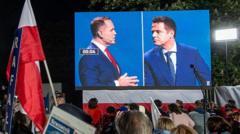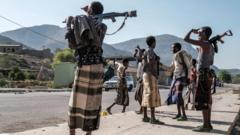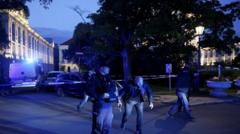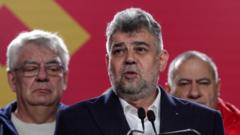Polls indicate a likely run-off between liberal mayor Rafal Trzaskowski and national-conservative historian Karol Nawrocki, setting up a critical moment after a decade of Andrzej Duda's presidency.
Tight Race Anticipated as Poland Prepares for Presidential Election

Tight Race Anticipated as Poland Prepares for Presidential Election
Poland braces for a highly competitive presidential election this Sunday, signaling a potential shift in its political landscape.
The outcome stands to redefine Polish democracy as voters express discontent with the established political parties, Civic Platform (PO) and Law and Justice (PiS).
As Poles head to the polls this Sunday, expectations are high for a closely contested presidential race. The frontrunners, Rafal Trzaskowski of the Civic Platform (PO) and Karol Nawrocki, backed by the opposition Law and Justice (PiS) party, are set to engage in a heated battle. If current polls hold true, this election may necessitate a run-off set for June 1, stemming from a widespread voter fatigue with the two dominant parties that have shaped Polish politics over the past 20 years.
Current front-runner Trzaskowski, who is also the mayor of Warsaw, represents a shift towards liberal values within Poland, while his rival Nawrocki represents national-conservative ideals. The significance of this election could be heightened by the new presidential powers, especially given that the incumbent president, Duda, cannot seek reelection after serving two consecutive terms.
Analysts argue that Tusk's coalition has struggled to deliver on many promises that attracted voters, leading to a sense of disillusionment in the electorate. Critics accuse PiS of a heavy-handed approach during its time in power, citing media manipulation and political interference.
The upcoming election is crucial, not just for party politics but for the broader implications of governance in Poland, especially as Tusk's coalition manages a precarious parliamentary majority. Controversy surrounds both candidates—ranging from issues of LGBTQ+ rights to accusations of corruption—demonstrating the complex landscape of Polish politics.
Discontent among voters has opened doors for other candidates beyond the traditional duopoly, with some sections of society seeking alternative representation. Tensions on issues like migration, women's rights, and LGBTQ+ rights continue to simmer, further complicating the electoral dynamics.
As the first round of voting approaches, uncertainty looms, with many citizens feeling trapped between what they perceive as two flawed choices. The outcome of this election could either maintain the status quo or usher in a transformative era for Poland, highlighting the critical need for change among its populace.
With the election just around the corner, Poland anxiously watches and waits, hoping for a voice that can bridge the deepening divides within the nation.
As Poles head to the polls this Sunday, expectations are high for a closely contested presidential race. The frontrunners, Rafal Trzaskowski of the Civic Platform (PO) and Karol Nawrocki, backed by the opposition Law and Justice (PiS) party, are set to engage in a heated battle. If current polls hold true, this election may necessitate a run-off set for June 1, stemming from a widespread voter fatigue with the two dominant parties that have shaped Polish politics over the past 20 years.
Current front-runner Trzaskowski, who is also the mayor of Warsaw, represents a shift towards liberal values within Poland, while his rival Nawrocki represents national-conservative ideals. The significance of this election could be heightened by the new presidential powers, especially given that the incumbent president, Duda, cannot seek reelection after serving two consecutive terms.
Analysts argue that Tusk's coalition has struggled to deliver on many promises that attracted voters, leading to a sense of disillusionment in the electorate. Critics accuse PiS of a heavy-handed approach during its time in power, citing media manipulation and political interference.
The upcoming election is crucial, not just for party politics but for the broader implications of governance in Poland, especially as Tusk's coalition manages a precarious parliamentary majority. Controversy surrounds both candidates—ranging from issues of LGBTQ+ rights to accusations of corruption—demonstrating the complex landscape of Polish politics.
Discontent among voters has opened doors for other candidates beyond the traditional duopoly, with some sections of society seeking alternative representation. Tensions on issues like migration, women's rights, and LGBTQ+ rights continue to simmer, further complicating the electoral dynamics.
As the first round of voting approaches, uncertainty looms, with many citizens feeling trapped between what they perceive as two flawed choices. The outcome of this election could either maintain the status quo or usher in a transformative era for Poland, highlighting the critical need for change among its populace.
With the election just around the corner, Poland anxiously watches and waits, hoping for a voice that can bridge the deepening divides within the nation.

















